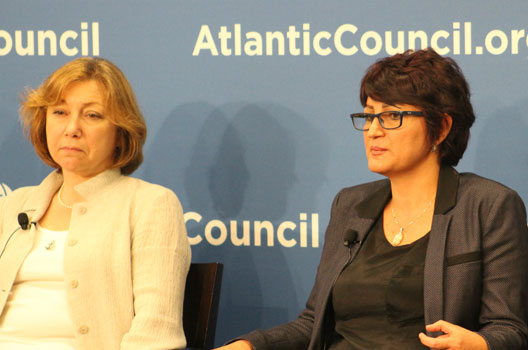 On July 14, the Atlantic Council’s Rafik Hariri Center for the Middle East hosted a discussion on the prospects for Syria featuring three women active in the Syrian opposition: Dr. Seve Aydin-Izouli, a lawyer and member of the Bar Association of Paris; Dr. Bassman Kodmani, a member of and spokesperson for the Geneva negotiations team of the Syrian opposition’s High Negotiations Committee (HNC); and Ms. Alise Mofrej, a Syrian politician and member of the HNC. Ambassador Frederic C. Hof, director of the Atlantic Council’s Rafik Hariri Center, moderated the discussion.
On July 14, the Atlantic Council’s Rafik Hariri Center for the Middle East hosted a discussion on the prospects for Syria featuring three women active in the Syrian opposition: Dr. Seve Aydin-Izouli, a lawyer and member of the Bar Association of Paris; Dr. Bassman Kodmani, a member of and spokesperson for the Geneva negotiations team of the Syrian opposition’s High Negotiations Committee (HNC); and Ms. Alise Mofrej, a Syrian politician and member of the HNC. Ambassador Frederic C. Hof, director of the Atlantic Council’s Rafik Hariri Center, moderated the discussion.
The discussion shed light on particular perspectives of the HNC and the Syrian opposition. In regards the Nusra Front, Kodmani indicated that the opposition usually deals with any group willing to cooperate; however, this is not always true of the Nusra Front. Ultimately, she explained, despite instances of cooperation, the Nusra Front is not an ally of the opposition. She also explained that in the early stages of the negotiations, the HNC suspected that de Mistura catered to the Russians and Iranians. However, over time they have established a strong working relationship with the envoy. Regarding the potential US-Russia agreement, Kodmani expressed concern that the HNC had not been consulted during its development.
Hof and Mofrej discussed the salient humanitarian issue of detainees in Syria. Mofrej explained that thousands of children and other people are detained, tortured, and often killed without reason. She herself was a detainee, and recounted graphic experiences and observations from her time in detention. She explained the extensive and varied efforts of the Syrian opposition to introduce mechanisms—through the international criminal court, through the United Nations, and other bodies—to address the issue of unlawful and often forced detention in Syria.
Hof and Aydin-Izouli spoke about the role of the Kurds in the Syrian conflict. Aydin-Izouli said the Kurds started out as a disenfranchised minority, as most of them did not even have citizenship. Toward the beginning of the conflict, they were granted citizenship, most likely to foster positive feelings between the Kurds and the Syrian government. She pointed out that the Kurds were the first organized opposition group in Syria, and they will play an important part in the eventual peace negotiations.
Image: Dr. Bassma Kodmani and Ms. Alise Mofrej listen to audience questions during the event.
